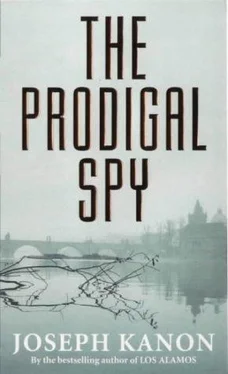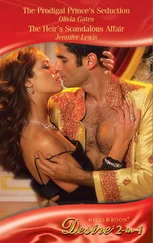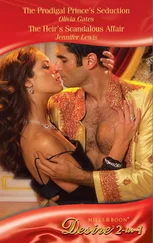Nick looked at him, curious, but his father misinterpreted his interest.
“He was writing a book on Jan Masaryk,” he explained. “His death. It’s still a controversy here, how he died.”
“Yes, Masaryk,” Frantisek said. “You know about Masaryk in America?”
“Yes,” Nick said, to be polite, but in fact who did anymore? A forgotten name. Twenty years ago, a famous leap from the Czernin Palace that was the end of the republic. A national hero’s funeral. Pictures in Life. In the West, a murder no one could prove and everyone forgot. But here, evidently, still an open wound, a reminder of the world before, like Anna’s china.
“He couldn’t hide the book,” Frantisek said. “Everyone knew what he was doing. Last year, when they opened the case, even the police wanted to help him. Everyone wanted the truth about Masaryk. Last year. Now they won’t even let you go to Lany. No flowers.”
“His grave,” his father said to Nick. “The family grave. Not far from Lidice. We’re a country of symbols here. It’s a way to talk to each other. Last year people started taking flowers there. A shrine. Now that would be an embarrassment to the government, too Czech, so they put an end to it.”
“People remember,” Frantisek said vaguely, his words a little slurred.
“What did he mean, when they opened the case? Who’s they?”
“The Government-the old Government, Dubcek. One of the first things he did was order an investigation into Masaryk’s death. It’s time to know the truth, he said. Of course, the Russians weren’t pleased. They knew what it meant. Another symbol, you see.”
“It’s twenty years ago.”
His father looked at him. “Yes. But a crime like that-to know the truth can be a political act.”
Nick looked back, reading the code. “Here,” he said.
“Like Masaryk,” Frantisek said again, lost now in drink.
“Is that how he did it?” Molly stood behind him, a dishtowel in her hand. “Like Masaryk? Out the window?”
“No, pills,” his father said, then to Frantisek, “he felt no pain. You just go to sleep. It’s the best way.”
Frantisek nodded. “The best way.”
“Such talk,” Anna said.
Nick looked at his father. Had he ever thought about it? Those years now were a story, a walk around the boat deck, but what had they really been like? Bad enough to wonder? A glass of water before bedtime. You just go to sleep.
“Masaryk said the window was the housemaid’s way out,” his father said. “A servant’s death.”
“Hah. That’s good, the housemaid’s,” Frantisek said. “Those fools. Did they think we would believe it? That he’d go like that?” He took another drink. “He thought he could work with them. Like Milos?”
“Our clothes must be dry,” Molly said, excusing herself.
The two men kept staring at their glasses. Nick listened to the sound of Molly on the stairs, Anna rattling the dishes in the sink. “Ach,” Frantisek said finally, out of words, tired of it all. He poured again from the bottle, clearly determined to pass out. Now Nick could hear the clock. Neither of them seemed to notice when he got up and left the room.
Upstairs, a low room under the pitched roof, Molly was brushing her hair, already changed. Finally alone.
“We should go,” she said casually, nodding toward his clothes. “He’s here for the night.”
“Look at me. What’s going on?”
“Nothing.” A sharp tug of the brush. “Everything’s lovely. A perfect weekend.”
“Stop it,” he said angrily, then lowered his voice. “Why are you hounding him? What police report?”
She glanced at him, then picked up her bag. “Not now. Let’s just go,” she said softly. “I’ll help Anna finish up.”
Nick sat on the bed for a minute, frustrated, looking around the room. A heavy crocheted bedspread, like a giant doily. A few books. He picked up the picture frame on the night table. His father and Anna, younger, smiling shyly. He still had all his hair. They were dressed for snow, bundled up, standing in an empty city square. Moscow? He wondered what the occasion was, who had taken the picture, then put it back. Their life-still a blank to him.
When he went back down, Frantisek was laid out on the couch, not yet really sleeping but no longer there. His father was covering him with a blanket. “You’re leaving?” he said, seeing the changed clothes. “So soon.”
“We have to get back.”
“No, no, he’ll sleep now. One more drink.”
He moved unsteadily, a little tipsy. Nick glanced toward the kitchen, where the women were working, then shrugged and joined him at the table.
“No more,” Anna said from the sink.
His father winked and poured out a glass. When had the drinking started?
“ Na zdravi,” he said, raising the glass slightly, and Nick drank, trying not to cough as the rough liquid hit his throat. His father said nothing, just looked at him, his eyes gentle, a little clouded. Then he reached over and patted Nick’s hand, his touch as hot as the drink. “I knew you would come,” he said, his voice low.
Nick nodded. A few hours ago he’d wanted to walk away, right through the woods, but he saw in the face, so like his own, that he could never do it. Upstairs, a stranger in a picture, and now, suddenly, a touch he’d known all his life.
“You see what it’s like here.”
His color had begun to drain, a sickly pale. What would he become, another Frantisek, sleeping it off on the couch?
“What I see is that you’ve had too much,” Anna said, coming over with some water and his pills. She put a hand to his forehead, shiny now with sweat. “How do you feel?”
His father placed the pills in his mouth, the movement deliberate and slow. “Perhaps a little tired,” he said quietly.
“It’s late,” Nick said, standing, eager now to get away. “You should get some rest. I’ll help you upstairs.” Anna moved toward him. “No, I’ll take him.”
“I’m all right.” His father waved his hand, a mild protest, but allowed himself to be lifted up and led by the elbow across the room.
Nick followed him up the stairs, then turned down the bed as his father began to undress. His body was bony, frail, and Nick looked away.
“You see what it’s like,” his father said again. “I can’t stay here.”
Nick faced him. “It may not be possible. You know that, don’t you?”
But his father grabbed his arm, clutching him. “No. It is. You think I don’t know what they want? I know. Something valuable. I can pay.”
Nick looked at him, dismayed. There was no talking to him. “Okay. But now let’s get some sleep,” he said, a nurse.
“We’ll meet tomorrow-I’ll come back early. The Narodni Gallery.” He began to cough. “Go around noon,” he gasped, trying to hold down another cough, so that it came out a desperate wheeze.
He took off his shorts and moved to the bed naked, his thin legs and ropy behind as white and vulnerable as a child’s. Nick turned away, hanging things in the wardrobe to avoid the sight of his body, and when he finally looked back his father was under the covers, his eyes closed, his hands folded over his chest. In that instant, Nick saw him as he would be, lying in a coffin, and his own breath went out of him, an unexpected panic. He stood holding the hanger, utterly alone in the room, as if he’d been abandoned. It was only when he saw the blanket stir, a faint rise, that he could move to the bed and lean over to arrange the covers.
His father opened his eyes and smiled. “Nicku,” he whispered. He reached up to smooth Nick’s hair back from his forehead, the old gesture. “Now you tuck me in.”
Nick nodded, feeling his father’s hand slip back.
Читать дальше












